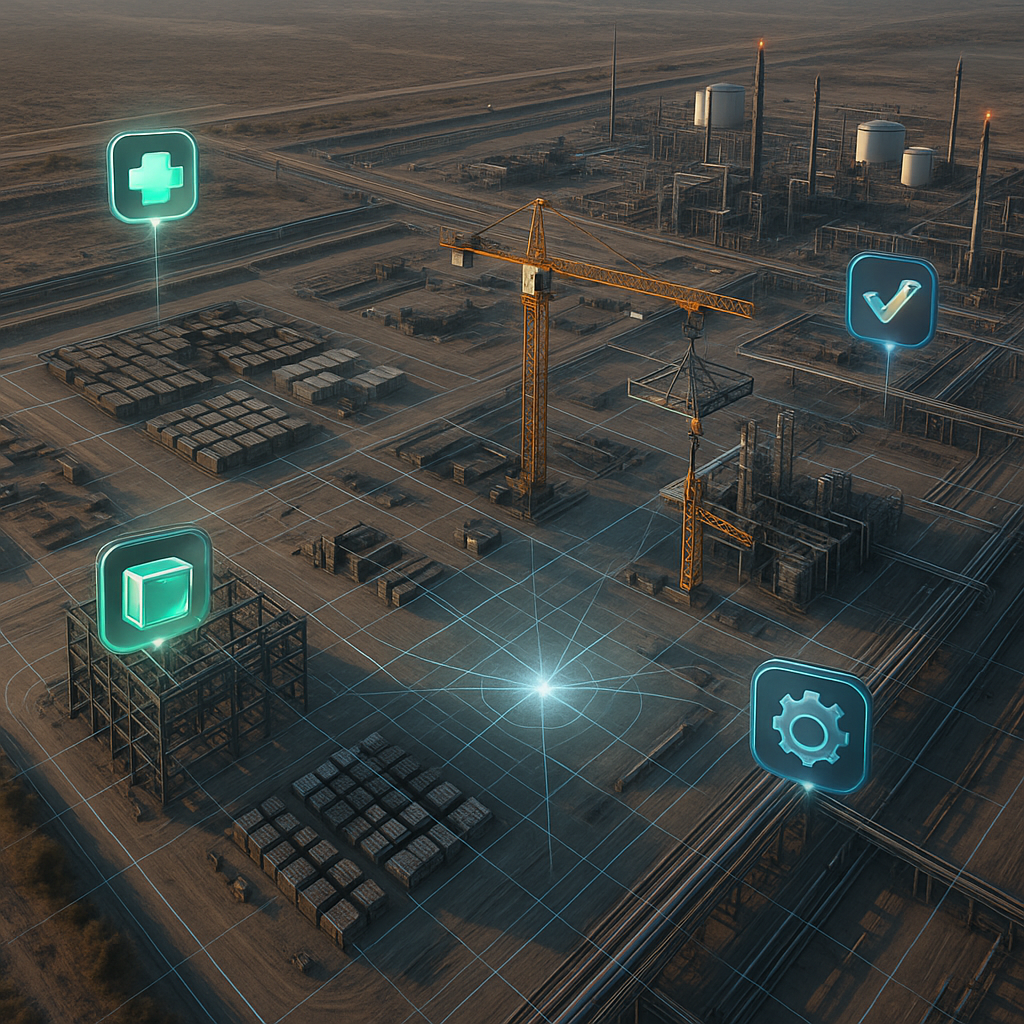Streamlining Operations with the Best Oil and Gas Accounting Software in 2026
Navigating the intricacies of the oil and gas industry demands impeccable financial management. The best oil and gas accounting software not only...
7 min read
 Astra Canyon Marketing
:
May 19, 2025 5:30:00 PM
Astra Canyon Marketing
:
May 19, 2025 5:30:00 PM
An outdated ERP system can hold your business back, creating inefficiencies that limit growth and adaptability. In fact, research by NetSuite shows that 93% of companies report improved operational efficiency after upgrading their ERP—highlighting the importance of a system designed for long-term scalability.
For industries like energy, mining, and aerospace, where operational complexity and regulatory requirements constantly evolve, a future-proof ERP is essential. It provides the flexibility to scale, integrate with emerging technologies, and adapt to market shifts without costly overhauls. But what exactly makes an ERP system future-proof? And how can your organization ensure that its ERP investment supports long-term success?
In this guide, we’ll explore the key features of a scalable ERP system, industries that benefit most from future-proofing, and best practices for choosing a solution that grows with your business.
A future-proof ERP system is a flexible and scalable solution designed to evolve alongside an organization’s changing requirements. Unlike static legacy systems that become obsolete over time, a modern ERP system is built to adapt to business growth, regulatory changes, and technological advancements.
Key features include cloud-based deployment for secure, on-demand data access and modular architectures for rolling out new functionalities without major disruptions. This design makes it particularly valuable in industries like oil and gas, where fluctuating demands and complex supply chains call for precision, speed, and reliability. Seamless integration with systems such as CRM, e-commerce platforms, and supply chain management software consolidates critical information, thereby empowering faster decision-making.
A static or outdated ERP creates the kind of inefficiencies that can slow operations and make it harder to respond to dynamic market conditions—a reality especially pronounced in industries such as mining and minerals or energy and resources. Obsolete systems also limit your ability to add new technologies, expand geographically, or adapt to regulatory shifts without costly workarounds.
By contrast, a future-proof ERP is built to handle expansion. It supports new sales channels, product lines, and larger data volumes without constant overhauls. This resilience is critical for organizations aiming to remain nimble in markets that experience sudden changes—like fluctuating commodity prices in oil and gas or evolving safety regulations in aerospace and defense. Whether you’re leveraging automated financial reporting or tracking global logistics in real time, an adaptable ERP gives you the infrastructure to keep pace with growth and avoid being blindsided by the next industry shift.
Organizations in highly regulated or infrastructure-intensive fields often face complex operational demands. From coordinating global supply chains to complying with stringent safety and environmental standards, these challenges require a modern and adaptable ERP solution. Below are four industries where a future-proof ERP can deliver significant advantages, enabling smooth scalability, real-time insights, and tighter control over mission-critical activities.
Companies in the energy, utilities, and resources sector often manage extensive infrastructures and must adhere to strict compliance rules. A future-proof ERP enables proactive maintenance schedules, transparent financial tracking, and quick adaptation to policy or market changes—all under one integrated system.
Fluctuating global prices and the complexity of upstream and downstream operations make oil and gas a prime candidate for a scalable ERP. Future-proof systems can unify exploration data, production metrics, and compliance records, enabling businesses to respond swiftly to changing economic conditions and environmental regulations.
Organizations in aerospace and defense grapple with long supply chains, international regulations, and intricate production cycles. These companies can better handle component traceability, government compliance, and defense contract management by adopting a modern ERP architecture—all critical factors for maintaining operational excellence.
In the mining and minerals industry, complex logistics, environmental considerations, and unpredictable resource availability underscore the need for robust reporting and forecasting. A scalable ERP, paired with advanced analytics, helps companies optimize extraction processes, mitigate safety risks, and manage inventory more effectively across geographically dispersed sites.
A future-proof ERP system grows with your business, adapts to shifting market conditions, and integrates with new technologies without disruption. The right approach minimizes costly upgrades, enhances operational efficiency, and ensures long-term scalability. To get the most out of your investment, focus on the following best practices:
Future-proofing an ERP system begins with a thorough evaluation of current business processes, projected growth strategies, and potential operational challenges. Engaging department heads and IT teams in the planning phase ensures that all critical workflows are mapped out before selecting an ERP solution. Identifying inefficiencies, such as manual data entry bottlenecks or fragmented reporting systems, helps in choosing the right ERP functionalities.
Anticipating future expansion is equally important. Businesses planning to enter new markets, introduce additional services, or adapt to evolving compliance regulations should select an ERP system with the flexibility to accommodate these changes. Defining clear performance benchmarks and outlining a structured implementation roadmap ensures that ERP modernization efforts align with long-term goals.
Cloud-based ERP solutions provide greater flexibility and security compared to traditional on-premise systems. Businesses benefit from automated software updates, scalable storage, and remote access, allowing teams to collaborate efficiently across different locations. The cloud model also enhances data security through encryption, multi-factor authentication, and continuous threat monitoring, reducing the risk of cyberattacks and data breaches.
Organizations that rely on cloud ERP platforms eliminate the need for costly hardware investments while gaining the ability to scale computing resources based on demand. This scalability ensures optimal system performance, even during peak business periods. Companies with remote teams or multi-location operations particularly benefit from cloud ERP, as real-time data access improves coordination between departments and enhances decision-making.
A modular ERP system allows businesses to implement essential functionalities first and expand their capabilities over time. Instead of immediately committing to a full-scale ERP deployment, companies can begin with core modules such as financial management, procurement, or supply chain optimization and gradually add features like customer relationship management (CRM), human resources (HR), or advanced analytics.
This phased approach minimizes disruptions during ERP implementation and ensures that businesses only pay for the modules they actively use. As organizational needs evolve, additional modules can be integrated seamlessly without overhauling the entire system. This level of flexibility allows businesses to maintain an efficient, cost-effective ERP strategy while keeping the system aligned with operational goals.
A well-integrated ERP system connects with existing business applications, such as e-commerce platforms, payment gateways, inventory management systems, and data analytics tools. Strong API frameworks and interoperability features reduce the need for manual data entry, eliminating inefficiencies caused by siloed information.
For businesses planning to incorporate emerging technologies such as AI-driven automation, IoT sensors for supply chain tracking, or predictive analytics, selecting an ERP with advanced integration capabilities is essential. A system that supports seamless connectivity with external tools ensures long-term adaptability and smooth transitions as new business technologies emerge.
Choosing an ERP vendor with a strong commitment to continuous product innovation and customer support ensures that businesses receive regular software enhancements, security updates, and system optimizations. Vendors with dedicated research and development teams often incorporate artificial intelligence, machine learning, and improved reporting functionalities into their ERP solutions, keeping businesses ahead of industry trends.
Look for ERP software vendors that consistently release relevant updates and invest in emerging technologies like machine learning or advanced analytics. Their product roadmap should align with industry-specific challenges, such as emissions tracking in the energy sector. Service Level Agreements (SLAs) that detail response times and upgrade schedules protect your business from unexpected downtime.
An ERP system’s effectiveness depends on how well employees understand and utilize its features. Companies should implement structured training programs, workshops, and online resources to ensure that staff can navigate the system efficiently. Training should not be limited to the initial ERP rollout—ongoing learning opportunities help employees stay updated on new functionalities and best practices.
Identifying key users within each department who can assist their teams with ERP-related tasks further improves adoption rates. An intuitive user interface, role-based dashboards, and mobile accessibility enhance the overall user experience, reducing resistance to system adoption.
Selecting the right technologies to support a future-proof ERP system ensures long-term scalability and performance. Businesses integrating cutting-edge tools into their ERP framework enhance efficiency, reduce operational risks, and improve overall decision-making.
Shifting to cloud services eliminates the need for expensive on-premise infrastructure while providing on-demand scalability and seamless access from any location. Organizations using cloud ERP benefit from automatic updates, advanced security features, and real-time data access, allowing teams to collaborate without geographical limitations.
Multi-cloud strategies further enhance system resilience by distributing workloads across different cloud platforms, ensuring uninterrupted performance and disaster recovery capabilities. Companies that adopt cloud ERP solutions reduce IT maintenance costs while ensuring that their system remains adaptable to future business requirements.
Future-proofing an ERP system requires more than just transactional data management. Incorporating advanced analytics and business intelligence (BI) tools helps organizations extract valuable insights from ERP-generated data. Businesses can leverage predictive analytics, automated reporting, and AI-driven recommendations to improve forecasting accuracy and optimize decision-making.
Integrating BI tools within an ERP system enables real-time monitoring of financial performance, supply chain efficiency, and customer behavior trends. This data-driven approach helps businesses proactively identify opportunities for growth while mitigating risks associated with fluctuating market conditions.
AI and machine learning (ML) technologies bring automation and intelligence to ERP systems, allowing businesses to improve operational efficiency while reducing manual workloads. Companies that integrate AI-powered process automation can optimize areas such as invoice processing, inventory forecasting, demand planning, and customer support.
Machine learning algorithms continuously analyze data patterns, helping organizations detect inefficiencies and recommend process improvements. AI-powered predictive maintenance enables manufacturing and logistics companies to identify potential equipment failures before they occur, minimizing downtime and preventing costly disruptions.
An ERP system that supports comprehensive API frameworks ensures smooth integration with external business applications, including e-commerce platforms, CRM solutions, and third-party financial software. Businesses that rely on flexible API connectivity eliminate data silos, allowing seamless information exchange across multiple systems.
Companies that plan to incorporate emerging technologies such as IoT devices, blockchain for supply chain tracking, or robotic process automation (RPA) benefit from an ERP system that is designed to handle these integrations effortlessly. Organizations that prioritize API-driven ERP ecosystems maintain the flexibility to adopt new tools and technologies without major system overhauls.
Automating manual processes within an ERP system reduces inefficiencies, accelerates task completion, and minimizes the risk of human error. Organizations that integrate workflow automation tools into their ERP can streamline functions such as purchase order approvals, customer invoicing, and compliance tracking.
Low-code and no-code automation platforms enable businesses to configure and modify workflows without requiring extensive programming knowledge. This flexibility ensures that companies can quickly adapt to regulatory changes, market fluctuations, and evolving internal processes without delaying operations.
Given that ERP systems store sensitive financial, operational, and customer data, robust cybersecurity measures are essential for future-proofing. Businesses that invest in multi-layered security solutions—including end-to-end encryption, multi-factor authentication, and AI-driven threat detection—can significantly reduce the risk of cyberattacks and data breaches.
In regulated industries like aerospace and defense, adopting a comprehensive security framework with continuous monitoring further enhances resilience. Additionally, many cloud-based ERP vendors bundle these protections, providing an extra layer of defense against modern threats.
A future-proof ERP ultimately aligns technology with changing business requirements, stays open to cloud-based approaches, and builds strong integrations through reliable vendor partnerships. Conducting regular maintenance, installing updates when they become available, adding essential customizations carefully, and training your teams to use these tools effectively, can help your business maintain a scalable, secure ERP environment that stands up to growth and shifting market dynamics.
At Astra Canyon, we specialize in IFS ERP solutions that help executives and decision-makers move confidently into the future. Our team of certified consultants covers every stage of your ERP journey—from implementation and system optimization to ongoing support and beyond. Interested in seeing how an IFS ERP can boost your efficiency and adaptability? Schedule a personalized demo or contact Astra Canyon for expert guidance on future-proofing your business to seamlessly adapt to new technologies.

Navigating the intricacies of the oil and gas industry demands impeccable financial management. The best oil and gas accounting software not only...

For decades, Enterprise Resource Planning (ERP) systems have been the reliable, if rigid, system of record for manufacturers. They managed...

Are your capital projects bleeding time and money because your systems don't talk?